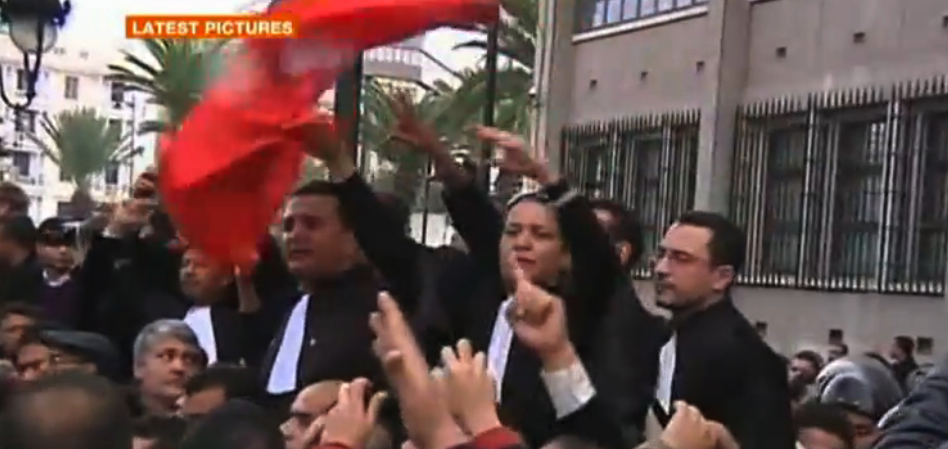A heavy burden of expectations lies on Tunisia, the small country where the Arab spring started a little over a year ago, not least because Western governments would like to see its transition to democracy provide a success story for the region. How Tunisians choose to confront the gross human rights abuses of the past will be an important part of this success story. As elsewhere, this process of “transitional justice” is likely to be a compromise between ideal scenarios and a more messy reality.
Tunisia’s newly elected government, a three-party coalition led by the Islamists of the Nahda (“Renaissance”) party, took office in late December. Samir Dilou, the senior Nahda figure who heads a new Ministry for Human Rights and Transitional Justice, is a former political prisoner, as are Ali Laarayedh, at the once feared Interior Ministry, and least seven other new Nahda ministers including the prime minister, Hamadi Jebali.
Of the Cabinet members drawn from Nahda’s two centre-left coalition partners — the Congress for the Republic and Ettakatol — several were rights activists under the regime of Zine el-Abidine Ben Ali, who fled to Saudi Arabia after the revolution.
This new administration is due to hold office for about a year, as the newly elected constituent assembly draws up a new constitution. It has taken easily to the vocabulary of a “democratic transition”, signalling that it envisages a process of “transitional justice” in which the nation will face up to the rights abuses of the past, most likely as far back as the 1950s, without necessarily referring each to a judicial system that is itself still struggling to rid itself of vestiges of the old regime.
Tunisia looks set, therefore, to provide the first example of a process of transitional justice — with fact-finding, judgements, and measures towards national reconciliation — launched under an Islamist-led government.
Ben Ali’s regime was adept at the “human rights” discourse, even as the treatment doled out to political prisoners, most recently to the Islamists in the early 1990s, was pitiless. The Tunisian section of Amnesty International last March released a list of 105 such prisoners known to have died either under torture or soon after their release, or who disappeared without trace.
But the new government is moving extremely cautiously in setting in motion an official process of “transitional justice”. It needs no reminding of the risks involved, and is perhaps assessing just how far it must compromise, if it is to preserve stability, with old-regime elements in the business world, the security services and the civil service. Its first weeks in office were extremely rocky, with a wave of intensified strikes and roadblocks in the north-west. Mr Jebali claimed that certain political actors stirred up these protests as part of a plan “to make the government fall within 90 days …. and to make the democratic transition fail”.
Also in January, Mr Laarayedh removed from his post the most senior commander of the riot police, who is facing charges over the shooting of demonstrators during the revolution. Within two days, an old, out-of-focus video allegedly showing Mr Laarayedh as a prisoner having sex with another prisoner reappeared, and found its way onto Tunisian Facebook pages. Ben Ali’s secret police used to circulate such videos, supposedly showing opposition figures in scandalous situations, to newspaper editors in the days before Facebook. This time the strategy backfired: post-revolutionary public opinion rallied behind the interior minister.
But another source of pressure comes from the fact that the Islamists’ victory in the October election has been badly received by secular leftists who were another facet of political opposition to the Ben Ali regime. (Under Ben Ali’s predecessor, President Habib Bourguiba, it was leftists who bore the brunt of state repression.) This strand of political opinion is ready to defend its secularist turf fiercely, and the government is under fire over the imprisonment of a newspaper editor for publishing a photograph of a nude German model. The jailing has stirred anxieties about whether an Islamist-led government will respect freedom of expression. Mr Dilou, who is also government spokesman, responded with a broadside attack on the news media, some of which, he said, is being used by old regime figures to distract attention from investigations into past abuses.
Three main coalitions of Tunisian NGOs are lining up to participate in deliberations over transitional justice — two of them made up of secular rights activists and a third, launched on February 17, aligned with Nahda. The risk is that the national debate over transitional justice could become entangled in ideological skirmishes between Islamists and secularists.
But Tunisia’s vibrant civil society and range of independent groups should, if things go well, be an asset, experts say. The previous government, in office for most of last year, allowed limited preparatory steps towards transitional justice, with the publication of a rather selective report on corruption, the commissioning of another report on the shooting of demonstrators during the revolution, and an initial trial in absentia of Ben Ali on some minor charges (which was judged hasty and unsatisfactory). For a more serious attempt at truth-finding and national reconciliation, those groups staking a claim to participate in the process will have to begin work together, and a first practical step is being taken in a project to bring together into one database all the archives held by the various NGOs into cases of rights abuses.
Eileen Byrne

